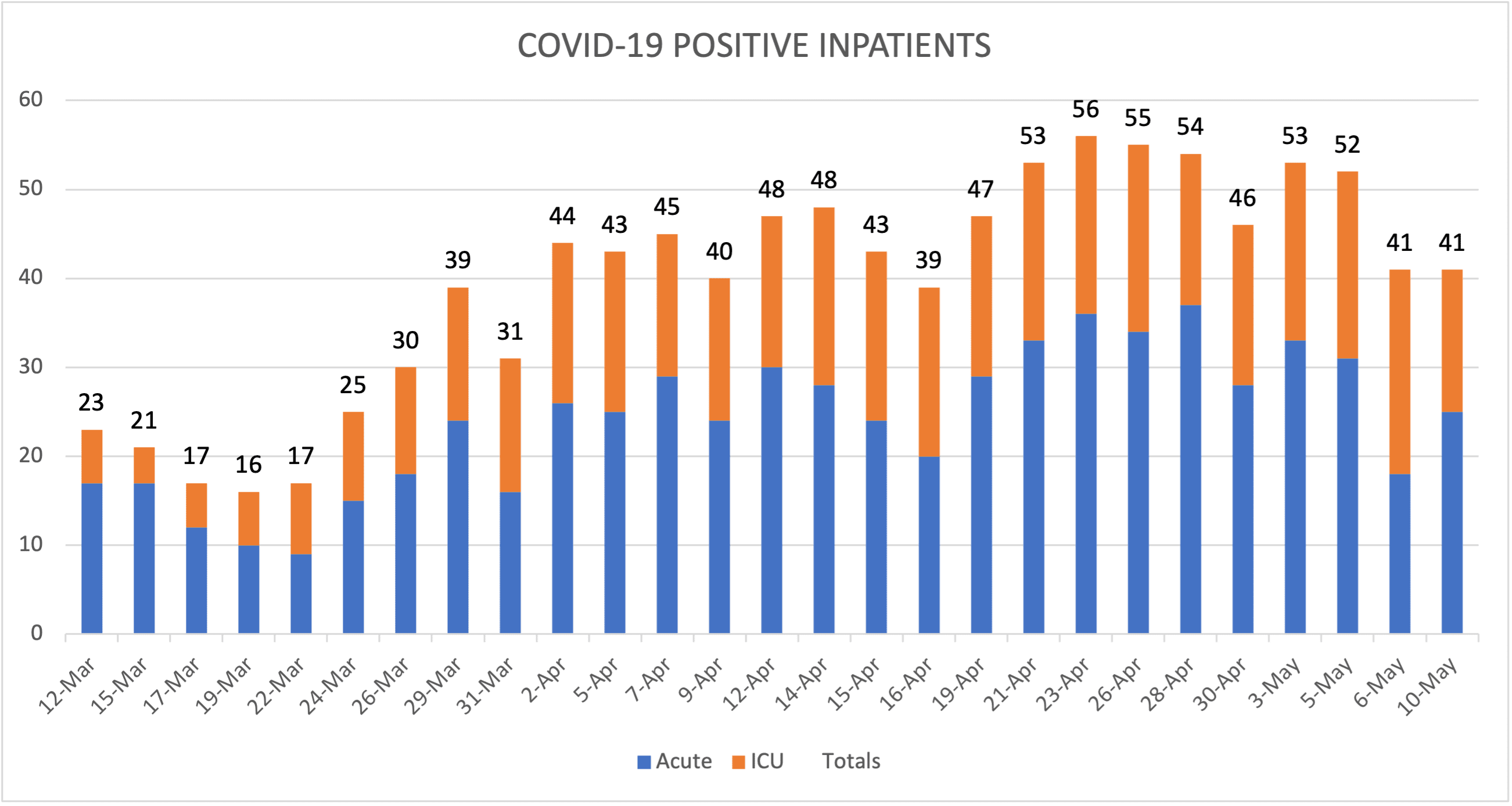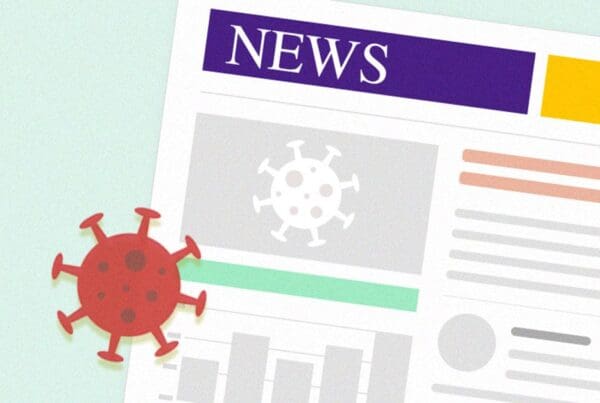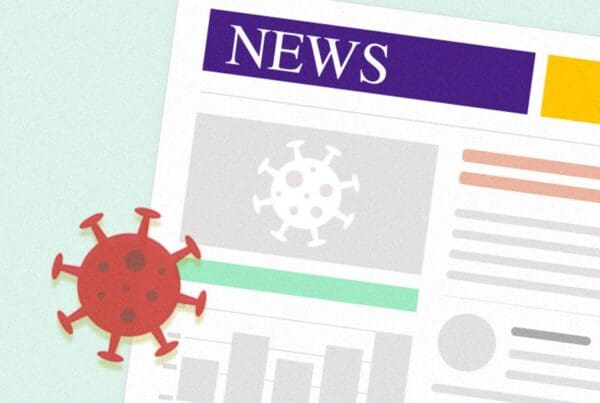Data Snapshot
UW Medicine Hospitals:

King County: The county reported 175 new positive cases and 0 new deaths on May 10.
Washington: The state reported 384,099 cases and 5,586 deaths as of May 9.
United States: The CDC reports 32,543,257 cases and 578,945 deaths as of May 11.
Global: WHO reports 158,651,638 confirmed COVID-19 cases and 3,299,764 deaths as of May 11.
Numbers update frequently, please follow links for most up-to-date numbers.
UW Medicine COVID-19 Vaccine Distribution Update
Total Vaccine Doses Administered: 273,935
- Total first dose: 151,257
- Total second dose: 122,678
As of May 9, 2021.
UW Medicine in the News
KIRO 7: COVID pandemic creates spike in mental illness
Featuring: Jürgen Unützer, Alysha Thompson, Psychiatry
“According to the Centers for Disease Control and Prevention, the COVID-19 pandemic has about 40% of the population struggling with mental health issues. UW Medicine is busy caring for patients. ‘We see a lot of anxiety and fear, PTSD, depression … some increase in substance use and addiction problems,’ said Dr. Jürgen Unützer, Chair of the Psychiatry Department at the University of Washington, caring for patients at UW Medicine. ‘There are those of use who were struggling with preexisting mental health and addiction problems, and for that group, I think this has been a real high-risk situation,’ said Unützer, ‘There are those of us who were doing okay before the pandemic, and we’ve experienced a level of stress and trauma that’s created new mental health and addiction problems.’”
King 5: COVID-19 vaccinations appear to be driving down infections in Washington state
Featuring: John Lynch, Allergy & Infectious Diseases
“After a fourth surge in COVID-19 cases and hospitalizations, the rate of hospitalizations is now beginning to go down as well, according to DOH data. ‘Two weeks ago, we were seeing some really sharp jumps in vaccinations across the state,’ said Cassie Sauer, the president and CEO of the Washington State Hospital Association (WSHA), which held its weekly briefing Monday morning. ‘I think we’re looking potentially at our last big surge,’ said Dr. John Lynch, Infectious Disease Specialist for UW Medicine at Harborview in Seattle, who helps lead his organization’s response to COVID-19. Harborview is still treating some of the hardest cases, such as those involving young people who are very sick, and unvaccinated. But while COVID-19 victims from around the state are still brought to Seattle for treatment, there is growing hope that the worst may be behind us, with some caveats. ‘The short answer is, yes, I think we are at an inflection point, and only the next few weeks is going to tell us,’ said Lynch, who noted this stands as along as there’s nothing major to shake up the status quo, like a new variant that could get past vaccines.”
Seattle Post-Intelligencer: ‘Not a one-size-fits-all approach’: Washington ranks 17th for share of people vaccinated
Featuring: Leo Morales, Chief Diversity Officer
“Up until now, people who were enthusiastic about seeking out the vaccine were the ones vying for the limited number of appointments. But now, the state appears to have moved forward. Dr. Leo Morales, professor and chief diversity officer at the University of Washington School of Medicine, described it as a spectrum, saying it might not just be an issue of vaccine hesitancy, but also of convenience. On one side of the spectrum are those people who were really excited about getting the vaccine, willing to drive far distances to get the shot as soon as they could. On the other side are those who have decided against getting the vaccine and little will change their minds. In the middle though, are those who aren’t necessarily as enthusiastic, but are willing to get the vaccine if they find easy access. Then, the spectrum moves to people who are more indifferent, who have some concerns and might need some more persuasion, to people who are more reluctant and have some more deep-seated concerns. ‘I think what we’ve done is move from vaccinating the enthusiastic to these other groups,’ Morales said. ‘The approach to each of these groups is going to be a little different. I think where we’re at now is really needing to make vaccines very convenient.’”
COVID-19 Literature Report
COVID-19 Literature Situation Report is a daily (M-F) newsletter put together by the Alliance for Pandemic Preparedness that provides a succinct summary of the latest scientific literature related to the COVID-19 pandemic.
Key Takeaways: COVID-19 Literature Situation Report May 6, 2021
- The Pfizer-BioNTech vaccine was estimated to be 90% effective against the B.1.1.7 SARS-CoV-2 variant and 75% effective against the B.1.351 variant 14 days or more after the second dose in Qatar. Estimated vaccine effectiveness against severe, critical, or fatal SARS-CoV-2 infection caused by any variant was 97%. More.
- The Pfizer-BioNTech vaccine was associated with 86%-90% lower incidence of asymptomatic SARS-CoV-2 infection 7 days or more after the second dose among cohorts of healthcare workers in the US and Israel, with even lower incidence of symptomatic infection. More and More.
- The Pfizer-BioNTech vaccine was estimated to be 95% effective against SARS-CoV-2 infection 7 days or more after the second dose according to national surveillance data from Israel (n=4.7 million) between January to April 2021, and 92% effective against asymptomatic infection. During the analysis period, 95% of positive specimens were likely B.1.1.7 infections. More.
- In a phase2a-b trial in South Africa, the NVX-CoV2373 (Novavax) nanoparticle vaccine indicated a 49% vaccine efficacy against SARS-CoV-2 infection among participants without anti-SARS-CoV-2 antibodies at baseline (n=2,684, 6% HIV-positive). An estimated 93% of infections were caused by the B.1.351 variant. More.
COVID-19 Literature Surveillance Team, is an affiliated group of medical students, PhDs and physicians keeping up with the latest research on SARS-CoV-2 / COVID-19 by finding the newest articles, reading them, grading their level of evidence and bringing you the bottom line.
Read the latest report: May 7 | Weekly COVID-19 LST Report.
Tweet of the Week
Vaccines are a home run for our community. ⚾️ pic.twitter.com/9mnebvszCH
— UW Medicine (@UWMedicine) May 11, 2021

